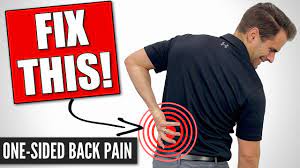What is best solution for back pain?
What is best solution for back pain?
The best solution for back pain can vary depending on the underlying cause and individual circumstances. Here are some general recommendations that may help alleviate and prevent back pain:
>>> How to Fix Low Back Pain
- Physical Activity:
- Engage in regular, low-impact exercises such as walking, swimming, or yoga to strengthen the muscles supporting your back.
- Posture Improvement:
- Maintain good posture, especially when sitting for extended periods. Use ergonomic furniture
- and make adjustments to your workspace if needed.
- Strengthening Core Muscles:
- Strengthening the core muscles can provide better support for the spine. Incorporate exercises that target the abdominal and back muscles.
- Appropriate Lifting Techniques:
- When lifting heavy objects, bend your knees and keep your back straight. Avoid lifting with your back, which can strain the muscles.
- Weight Management:
- Maintain a healthy weight to reduce the load on your spine and lower back.
- Stretching and Flexibility Exercises:
- Incorporate stretching exercises to improve flexibility and reduce muscle tension.
- Use of Supportive Mattress and Pillows:
- Ensure your mattress and pillows provide adequate support for your spine. A medium-firm mattress is often recommended.
- Heat and Cold Therapy:
- Apply heat or cold packs to the affected area. Heat can help relax muscles, while cold can reduce inflammation.
- Over-the-Counter Pain Relief:
- Non-prescription pain relievers such as ibuprofen or acetaminophen may provide temporary relief. Consult with a healthcare professional before long-term use.
- Professional Help:
- If your back pain persists or is severe, consult a healthcare professional, such as a physical therapist, chiropractor, or orthopedic specialist, for personalized advice and treatment.
- Mind-Body Techniques:
- Practices like meditation, deep breathing, or mindfulness can help manage stress, which may contribute to back pain.
- Avoid Prolonged Inactivity:
- Avoid sitting or standing in one position for too long. Take breaks and stretch regularly, especially if you have a sedentary lifestyle.
It’s crucial to note that these suggestions are general in nature, and the best solution for back pain may vary from person to person. If you’re experiencing persistent or severe back pain, it’s important to seek professional medical advice for a thorough evaluation and tailored treatment plan.
What is best solution for back pain?
Certainly, here are a few additional considerations for managing and preventing back pain:
- Physical Therapy:
- A physical therapist can provide exercises and techniques to address specific muscle imbalances or weaknesses contributing to back pain.
- Massage Therapy:
- Regular massages may help relieve muscle tension and improve circulation. A professional massage therapist can target specific areas of discomfort.
- Acupuncture:
- Some people find relief from back pain through acupuncture, an alternative therapy that involves inserting thin needles into specific points on the body.
- Hydration:
- Staying hydrated is essential for maintaining the elasticity of spinal discs. Drink an adequate amount of water throughout the day.
- Avoid High Heels:
- Wearing high heels can affect your posture and contribute to back pain. Opt for comfortable, supportive footwear.
- Quit Smoking:
- Smoking can reduce blood flow to the spine and contribute to disc degeneration. Quitting smoking may have positive effects on back health.
- Yoga and Pilates:
- These low-impact exercises can improve flexibility, strengthen core muscles, and promote overall spinal health.
- Back Supports and Braces:
- Depending on the cause of your back pain, your healthcare provider may recommend specific supports or braces to provide stability.
- Inversion Therapy:
- Some people find relief from back pain through inversion tables or hanging upside down. However, it’s important to consult with a healthcare professional before trying this method.
- Stay Informed and Educated:
- Learn about proper body mechanics and ergonomics to prevent injuries during daily activities.
- Cognitive-Behavioral Therapy (CBT):
- For individuals whose back pain is influenced by psychological factors, CBT can be a useful approach to manage pain and improve coping mechanisms.
Remember, it’s crucial to consult with healthcare professionals to determine the most appropriate solution for your specific situation. They can provide a comprehensive assessment and guide you toward an effective and personalized treatment plan for managing and preventing back pain.
Check our Latest products!
AI Tools
AI Tools
Chinese language
Women's Health Care Products
CALIYI Folding Mini Pocket Hair Comb with Mirror – Your Perfect Travel














Reviews
There are no reviews yet.